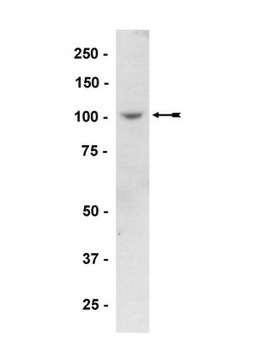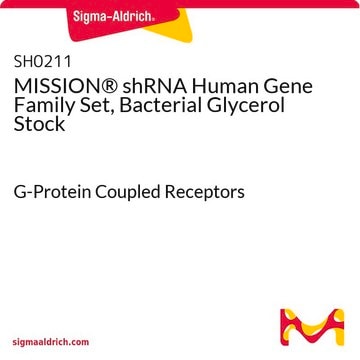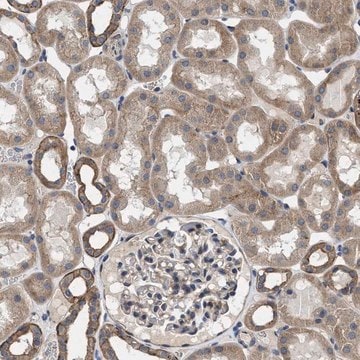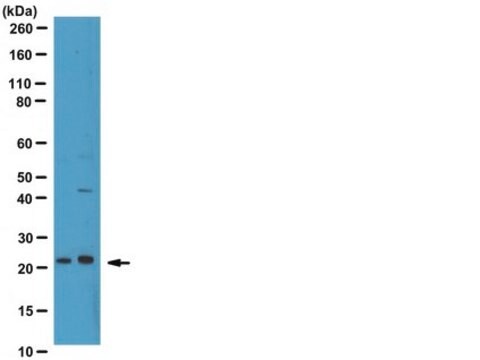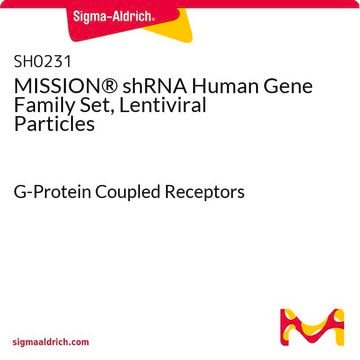おすすめの製品
由来生物
rabbit
品質水準
抗体製品の状態
affinity isolated antibody
抗体製品タイプ
primary antibodies
クローン
polyclonal
形状
liquid
含みます
≤0.1% sodium azide as preservative
化学種の反応性
human
メーカー/製品名
Calbiochem®
保管条件
OK to freeze
アイソタイプ
IgG
輸送温度
wet ice
保管温度
2-8°C
ターゲットの翻訳後修飾
unmodified
遺伝子情報
human ... PKD2(5311)
詳細
Immunoaffinity purified rabbit polyclonal antibody. Recognizes the ~105 kDa PKD2 protein.
Recognizes the ~105 kDa PKD2 protein in HEK293 cells.
This Anti-PKD2 Rabbit pAb is validated for use in Immunoblotting, Immunoprecipitation for the detection of PKD2.
免疫原
Human
a synthetic peptide corresponding to amino acids near the C-terminus of human PKD2
アプリケーション

Immunoblotting (1:500-1:5000)
Immunoprecipitation (1-4 g/mg lysate)
包装
Please refer to vial label for lot-specific concentration.
警告
Toxicity: Highly Toxic (H)
物理的形状
In PBS.
再構成
Following initial use, aliquot and freeze (-20°C) for long-term storage. Avoid freeze/thaw.
アナリシスノート
Positive Control
HEK 293 cells
HEK 293 cells
その他情報
Rey, O., et al. 2003. Biochem. Biophys. Res. Commun.302, 817.
Sturany, S., et al. 2002. J. Biol. Chem.277, 29431.
Sturany, S., et al. 2001. J. Biol. Chem.276, 3310.
Sturany, S., et al. 2002. J. Biol. Chem.277, 29431.
Sturany, S., et al. 2001. J. Biol. Chem.276, 3310.
This antibody does not cross-react with PKD1 or PKD3. Antibody should be titrated for optimal use in individual systems.
法的情報
CALBIOCHEM is a registered trademark of Merck KGaA, Darmstadt, Germany
Not finding the right product?
Try our 製品選択ツール.
保管分類コード
12 - Non Combustible Liquids
WGK
nwg
引火点(°F)
Not applicable
引火点(℃)
Not applicable
適用法令
試験研究用途を考慮した関連法令を主に挙げております。化学物質以外については、一部の情報のみ提供しています。 製品を安全かつ合法的に使用することは、使用者の義務です。最新情報により修正される場合があります。WEBの反映には時間を要することがあるため、適宜SDSをご参照ください。
Jan Code
ST1042-UG:
ST1042-50UG:
試験成績書(COA)
製品のロット番号・バッチ番号を入力して、試験成績書(COA) を検索できます。ロット番号・バッチ番号は、製品ラベルに「Lot」または「Batch」に続いて記載されています。
Clara Aicart-Ramos et al.
The Journal of biological chemistry, 291(45), 23516-23531 (2016-09-25)
Protein kinase D (PKD) isoforms are protein kinase C effectors in signaling pathways regulated by diacylglycerol. Important physiological processes (including secretion, immune responses, motility, and transcription) are placed under diacylglycerol control by the distinctive substrate specificity and subcellular distribution of
Jianfen Guo et al.
The Journal of biological chemistry, 286(8), 6500-6509 (2010-12-16)
Protein kinase D (PKD) exists as a family of structurally related enzymes that are activated through similar phosphorylation-dependent mechanisms involving protein kinase C (PKC). While individual PKD isoforms could in theory mediate distinct biological functions, previous studies identify a high
Tim Eiseler et al.
The Journal of biological chemistry, 291(1), 462-477 (2015-10-29)
Vesicle formation and fission are tightly regulated at the trans-Golgi network (TGN) during constitutive secretion. Two major protein families regulate these processes: members of the adenosyl-ribosylation factor family of small G-proteins (ARFs) and the protein kinase D (PKD) family of
Milena Armacki et al.
Gastroenterology, 159(3), 1019-1035 (2020-05-25)
Pancreatic tumor cells release small extracellular vesicles (sEVs, exosomes) that contain lipids and proteins, RNA, and DNA molecules that might promote formation of metastases. It is not clear what cargo these vesicles contain and how they are released. Protein kinase
Christoph Wille et al.
Journal of leukocyte biology, 104(3), 615-630 (2018-04-16)
Neutrophils are important mediators of the innate immune defense and of the host response to a physical trauma. Because aberrant infiltration of injured sites by neutrophils was shown to cause adverse effects after trauma, we investigated how neutrophil infiltration could
ライフサイエンス、有機合成、材料科学、クロマトグラフィー、分析など、あらゆる分野の研究に経験のあるメンバーがおります。.
製品に関するお問い合わせはこちら(テクニカルサービス)